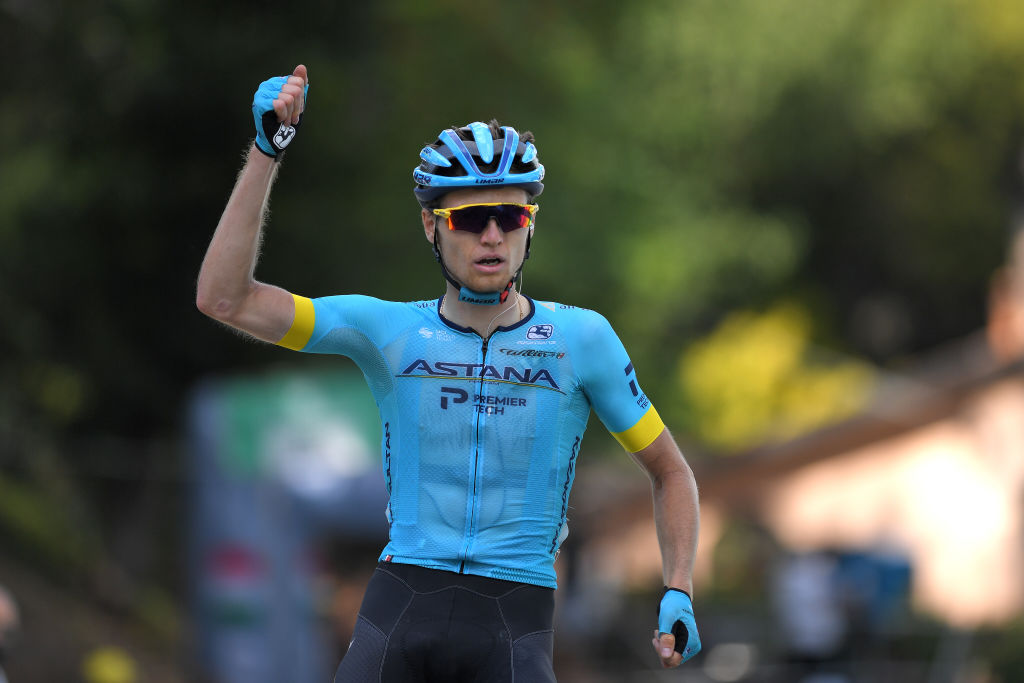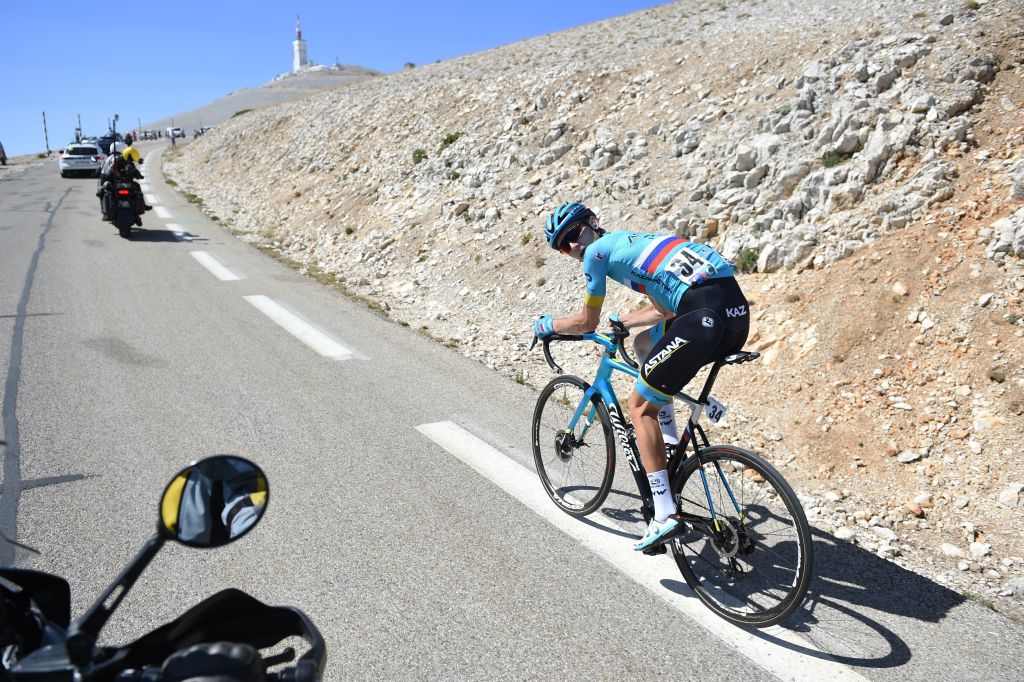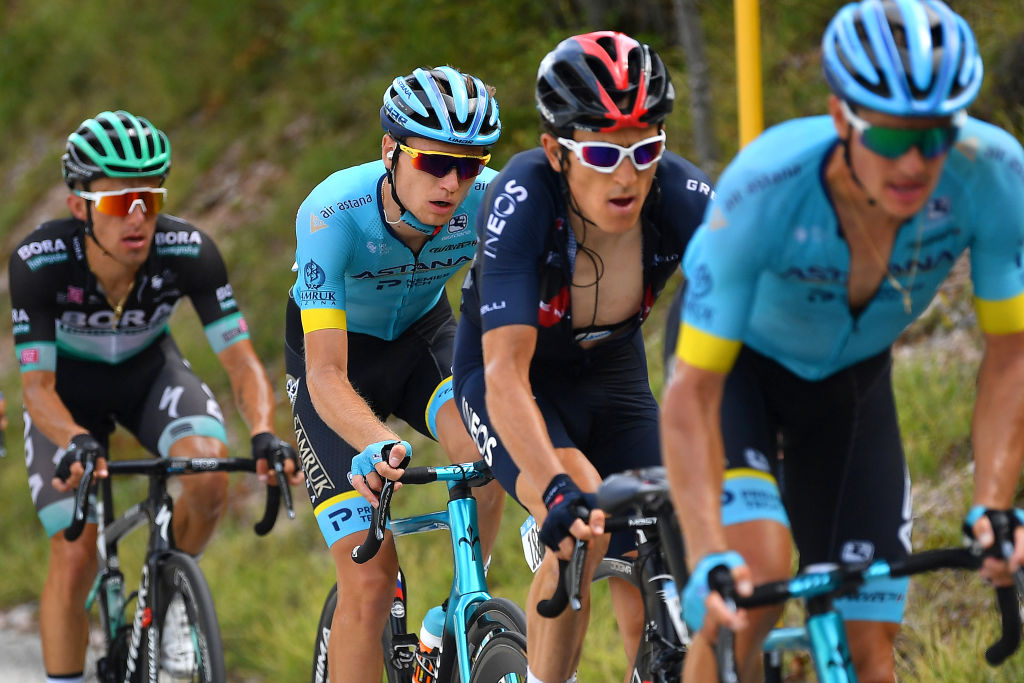Aleksandr Vlasov takes aim at the 2021 Giro d'Italia
Russian given leadership role at Astana after breakthrough 2020 season

Aleksandr Vlasov is considered an outsider for this year’s Giro d’Italia but the 24-year-old Russian is definitely a podium contender and has a subtle but significant advantage that could be vital during three weeks of racing on Italian roads in May.
Vlasov hails from Vyborg, north of Saint Petersburg, but raced in Italy throughout his under-23 years and early career with Gazprom, laying the solid foundations to his career in ‘il bel paese’.
He is quiet like most young Russian riders but has also picked up the confidence and conviction that comes from racing and developing successfully via the selective Italian amateur scene. Competing against Italian riders for opportunities and then a professional contract requires resilience, determination and talent. Vlasov seems to have all three and riding the Giro d’Italia will feel like racing at home.
“I suppose Italy is like a second home for me,” he tells Cyclingnews after Astana- Premier Tech confirmed him as their designated team leader for the Giro d’Italia.
“I learnt Italian over the last six years. I rode for the Viris Maserati Sisal team for three years between 2015 and 2017, living in Vigevano near Milan, and then I lived near Lake Garda when I was at Gazprom in 2018 and 2019. I now live in Andorra but I learnt to become a cyclist and learnt to live alone in Italy. I still think in Italian sometimes and I still only eat Italian food.”
Vlasov made steady but consistent progress since his days on the back row of the Viris Maserati Sisal team photo, mixing a local and national Italian race programme with spells with the Russian national team.
He was sixth at the prestigious and hilly GP Capodarco in 2016 was fourth on a stage at the Tour de L’Avenir behind compatriot Pavel Sivakov.
Get The Leadout Newsletter
The latest race content, interviews, features, reviews and expert buying guides, direct to your inbox!
His 2017 season was consistent but less impressive but still enough to earn him a professional contract at Gazprom-Rusvelo and development in the Russian programme. He suffered at the Abu Dhabi Tour, Tirreno-Adriatico and the Tour of the Alps but it gave him the form to impress with the Russian team when he stepped back down to under-23 level. He won the mountain stage of the Toscana Terra di Ciclismo Eroica with a solo attack and then beat Joao Almeida and Rob Stannard to win the 2018 under-23 Giro d’Italia. He was also fourth at the Tour de L’Avenir and so on the radar of a number of WorldTour teams.
The progress continued in 2019 with a number of placings while still with Gazprom, including third at the Vuelta Asturias in Spain and fifth at the Tour of Austria, where he also won the Kitzbüheler Horn mountain finish.
Vlasov had carved out a leadership role at Gazprom but surprisingly moved to Astana to step up to WorldTour level. He was not afraid of change or a challenge, just as when he moved to Italy as an 18-year-old.
The COVID-19 pandemic, the spring lockdown and the four-month suspension of racing wrecked the season for lots of riders. Yet Vlasov continued to develop and improve as a rider.
“It was a complex season for everyone for lots of different reasons. Fortunately for me it went pretty well,” he says. “I won three races and was pretty consistent all season. I made a name for myself.”
Indeed, Vlasov won the uphill stage to La Ciotat at the Tour de la Provence before the lockdown and came back strong in the summer, winning the Mont Ventoux Dénivelé Challenge race to the summit of the legendary mountain.

Vlasov attacked with 4.5km to go, caught and dropped Guillaume Martin and then held off a late chase by Richie Porte to win by 18 seconds. He then finished third behind teammate Jakob Fuglsang at Il Lombardia, out riding the likes of Bauke Mollema, Giulio Ciccone and Vincenzo Nibali and won again at Giro dell’Emilia.
Those results sparked reports that his agent Giuseppe Acquadro was trying to get him out of his contract with Astana for a move to Ineos Grenadiers. However, Astana knew that Miguel Angel Lopez was leaving for Movistar and were determined to hold Vlasov to his contract for 2021.
Vlasov was supposed to share team leadership with Fuglsang and Lopez at the Giro d’Italia last October but the Colombian crashed in the opening time trial and Palermo and Vlasov’s race also ended early when he climbed off during stage 2 to Agrigento.
“I was really ill, I’d caught a stomach virus and couldn’t carry on,” he explains, keen to squash rumours that his relationship with Astana was a critical point during the Giro d’Italia.
“I went home and recovered and that meant I could then ride the Vuelta. I suffered in the opening days of the Vuelta but the rest of the race went well.
"I think I show what I can do in Grand Tours. I was second on the stage to the Angliru and I was always up there with the best climbers. I’m older and wiser now. I’ve matured. Now I know what a Grand Tour is really like. 2020 taught me a lot.”
Vlasov finished 11th overall at the Vuelta. He was in the fight on all the mountain finishes and was only 16 seconds behind Hugh Carthy on the mighty Angliru.
Aiming high and the 2021 Giro
At the recent Astana-Premier Tech team presentation, Alexander Vinokourov piled responsibility on Vlasov shoulder’s for 2021 while also giving him an opportunity to continue his career trajectory. With Lopez now at Movistar and Fuglsang giving up targeting any Grand Tour podium, vlasov will be team leader for the Giro d’Italia.
“The last time was when we won the Giro d’Italia with Vincenzo Nibali in 2016. I have a dream to come back on a winning way at the grand tours and to win another big race. The Giro this year looks good for us so we will see,” Vinokourov said.
Vlasov told Cyclingnews he was happy to shoulder the leadership role.
“I think it’s right to aim high. I’ve always got to make another step up. I did well at the Vuelta and so now it’s right I try to do well at the Giro d’Italia. I’ll aim for a place on the podium, why not? Of course. I aim to win too but it all depends on how the race goes. A podium would be a good result for me and the team.”

The route of the Giro d’Italia will be presented on February 4, with the balance between time trials and mountain finishes expected to tip in the climber’s favour yet again.
Vlasov lost over two minutes to Primož Roglič in the Vuelta a España time trial but is confident he can limit his losses in the shorter and more technical time trials expected at the Giro d’Italia. In the 2018 under-23 Giro d’Italia he finished seventh in the final time trial up the Cà del Poggio climb to win overall.
“Climbing is my best strength but I’m also working a lot on my time trialing because the time trials are so important in Grand Tours,” he assures.
“You can lose time in time trials and now it’s so very difficult to get back in the mountains. Fortunately it seems the Giro will be hard, for sure they’ll be some high mountain finishes.”
Vlasov should begin his 2021 season at the Tour de la Provence. He was due to ride the Volta ao Algarve before targeting Paris-Nice but now has a gap in his schedule after the postponement of the Portuguese race.
The spring will be filled with altitude camps and the Tour of the Alps before the Giro d’Italia starts on May 8. The Olympic road race is another goal but Vlasov places in a far-off second part of the season, after his tilt at the Giro d’Italia.
“I’ve got to see how the first part of the season goes first of all,” he says.
The Giro d’Italia will no doubt be the watershed moment that decides his future. A podium place or better will significantly improve his hand in contract talks with Astana, Ineos Grenadiers and anyone else.
Vlasov is careful but bold, seemingly unafraid of any pressure from Astana to stay and keen to keep his options open.
"I’ll start the season and then we’ll talk with Astana about the future. I could stay, why not? But I’ll consider all the options and offers.”

Stephen is one of the most experienced member of the Cyclingnews team, having reported on professional cycling since 1994. He has been Head of News at Cyclingnews since 2022, before which he held the position of European editor since 2012 and previously worked for Reuters, Shift Active Media, and CyclingWeekly, among other publications.